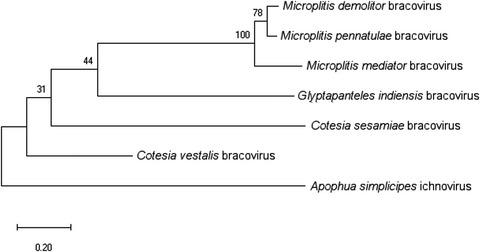当前位置:
X-MOL 学术
›
Entomol. Exp. Appl.
›
论文详情
Our official English website, www.x-mol.net, welcomes your
feedback! (Note: you will need to create a separate account there.)
Does the solitary parasitoid Microplitis pennatulae use a combinatorial approach to manipulate its host?
Entomologia Experimentalis et Applicata ( IF 1.4 ) Pub Date : 2020-03-18 , DOI: 10.1111/eea.12887 Prabitha Mohan 1 , Palatty Allesh Sinu 1
Entomologia Experimentalis et Applicata ( IF 1.4 ) Pub Date : 2020-03-18 , DOI: 10.1111/eea.12887 Prabitha Mohan 1 , Palatty Allesh Sinu 1
Affiliation

|
Host manipulation is a strategy used by some parasites to enhance their transmission. These parasites use a combination of neuropharmacological, psychoneuroimmunological, genomic/proteomic, or symbiont‐mediated mechanisms to manipulate their hosts. Bodyguard manipulation occurs when parasitized hosts guard parasitoid pupae to protect them from their natural enemies. Bodyguard‐manipulated hosts exhibit altered behaviours only after the egression of parasitoid prepupae. Behavioural changes in post‐parasitoid egressed hosts could have resulted from their altered physiology. Previous studies have shown that gregarious manipulative parasitoids induce multiple physiological changes in their host, but the physiological changes induced by solitary manipulative parasitoids are unknown. Microplitis pennatulae Ranjith & Rajesh (Hymenoptera: Braconidae) is a larval parasitoid of Psalis pennatula Fabricius (Lepidoptera: Erebidae). After the egression of parasitoid prepupae, P. pennatula stops its routine activities and protects the parasitoid pupa from hyperparasitoids by body thrashes. In this study, we looked into the physiological changes induced by the solitary manipulative parasitoid, M. pennatulae, in its host, P. pennatula, during various stages of parasitization. We considered octopamine concentration and phenoloxidase (PO) activity as biomarkers of physiological change. We also examined whether M. pennatulae has a symbiotic virus and whether the wasp transfers it to the host during parasitization. We found that octopamine concentration was low in the pre‐parasitoid egressed host, but it was elevated after the parasitoid egressed. Phenoloxidase activity was lower in the pre‐ and post‐parasitoid egressed host than in the unparasitized host. We also detected symbiotic bracovirus (BV) in the wasp ovaries and isolated the BV virulence gene from the parasitised host. Our study suggests that solitary parasitoids also induce multiple physiological changes to influence the host behaviour to their advantage, as is the case with the gregarious parasitoids.
中文翻译:

孤立的寄生蜂 Microplitis pennatulae 是否使用组合方法来操纵其宿主?
宿主操纵是一些寄生虫用来增强其传播的策略。这些寄生虫结合使用神经药理学、心理神经免疫学、基因组/蛋白质组学或共生体介导的机制来操纵宿主。当寄生宿主保护寄生蛹以保护它们免受天敌的侵害时,就会发生保镖操纵。保镖操纵的宿主只有在寄生性预蛹离开后才会表现出改变的行为。寄生后离开宿主的行为变化可能是由于它们的生理改变所致。以往的研究表明,群居的操纵性寄生蜂会在其宿主中引起多种生理变化,但独居操纵性寄生蜂引起的生理变化尚不清楚。Microplitis pennatulae Ranjith & Rajesh(膜翅目:Braconidae) 是 Psalis pennatula Fabricius (Lepidoptera: Erebidae) 的幼虫寄生蜂。寄生蜂预蛹离开后,P. pennatula 停止其日常活动,并通过身体鞭打保护寄生蜂蛹免受超寄生蜂的侵害。在这项研究中,我们研究了在寄生的不同阶段,由单独的操纵性寄生蜂 M. pennatulae 在其宿主 P. pennatula 中引起的生理变化。我们将章鱼胺浓度和酚氧化酶 (PO) 活性视为生理变化的生物标志物。我们还检查了 M. pennatulae 是否有共生病毒以及黄蜂是否在寄生过程中将其转移给宿主。我们发现,前寄生物离开宿主中章鱼胺浓度较低,但在寄生物离开后升高。寄生物前和寄生物后的酚氧化酶活性低于未寄生宿主。我们还在黄蜂卵巢中检测到共生布拉科病毒 (BV),并从寄生宿主中分离出 BV 毒力基因。我们的研究表明,与群居的寄生蜂一样,独居寄生蜂也会引起多种生理变化,从而影响寄主的行为使其有利。
更新日期:2020-03-18
中文翻译:

孤立的寄生蜂 Microplitis pennatulae 是否使用组合方法来操纵其宿主?
宿主操纵是一些寄生虫用来增强其传播的策略。这些寄生虫结合使用神经药理学、心理神经免疫学、基因组/蛋白质组学或共生体介导的机制来操纵宿主。当寄生宿主保护寄生蛹以保护它们免受天敌的侵害时,就会发生保镖操纵。保镖操纵的宿主只有在寄生性预蛹离开后才会表现出改变的行为。寄生后离开宿主的行为变化可能是由于它们的生理改变所致。以往的研究表明,群居的操纵性寄生蜂会在其宿主中引起多种生理变化,但独居操纵性寄生蜂引起的生理变化尚不清楚。Microplitis pennatulae Ranjith & Rajesh(膜翅目:Braconidae) 是 Psalis pennatula Fabricius (Lepidoptera: Erebidae) 的幼虫寄生蜂。寄生蜂预蛹离开后,P. pennatula 停止其日常活动,并通过身体鞭打保护寄生蜂蛹免受超寄生蜂的侵害。在这项研究中,我们研究了在寄生的不同阶段,由单独的操纵性寄生蜂 M. pennatulae 在其宿主 P. pennatula 中引起的生理变化。我们将章鱼胺浓度和酚氧化酶 (PO) 活性视为生理变化的生物标志物。我们还检查了 M. pennatulae 是否有共生病毒以及黄蜂是否在寄生过程中将其转移给宿主。我们发现,前寄生物离开宿主中章鱼胺浓度较低,但在寄生物离开后升高。寄生物前和寄生物后的酚氧化酶活性低于未寄生宿主。我们还在黄蜂卵巢中检测到共生布拉科病毒 (BV),并从寄生宿主中分离出 BV 毒力基因。我们的研究表明,与群居的寄生蜂一样,独居寄生蜂也会引起多种生理变化,从而影响寄主的行为使其有利。











































 京公网安备 11010802027423号
京公网安备 11010802027423号